高中英语将来进行时技巧(很有用)及练习题
高中英语将来进行时技巧(很有用)及练习题含解析
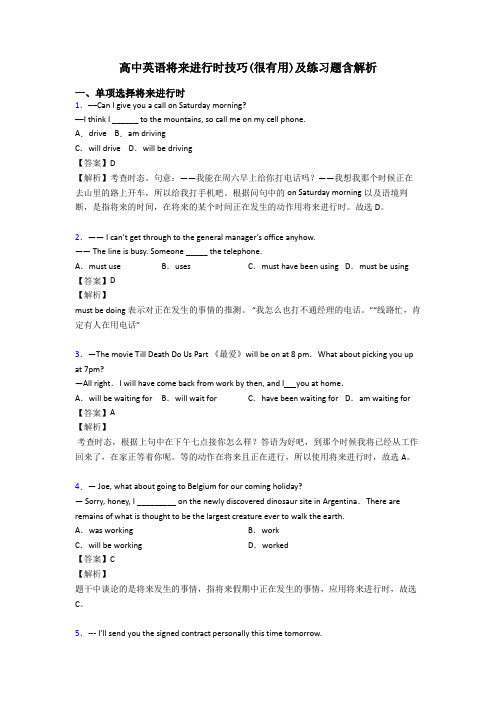
高中英语将来进行时技巧(很有用)及练习题含解析一、单项选择将来进行时1.––Can I give you a call on Saturday morning?––I think I ______ to the mountains, so call me on my cell phone.A.drive B.am drivingC.will drive D.will be driving【答案】D【解析】考查时态。
句意:——我能在周六早上给你打电话吗?——我想我那个时候正在去山里的路上开车,所以给我打手机吧。
根据问句中的on Saturday morning以及语境判断,是指将来的时间,在将来的某个时间正在发生的动作用将来进行时。
故选D。
2.——I can’t get through to the general manager’s office anyhow.—— The line is busy. Someone _____ the telephone.A.must use B.uses C.must have been using D.must be using 【答案】D【解析】must be doing 表示对正在发生的事情的推测。
“我怎么也打不通经理的电话。
”“线路忙,肯定有人在用电话”3.—The movie Till Death Do Us Part 《最爱》will be on at 8 pm.What about picking you up at 7pm?—All right.I will have come back from work by then, and I you at home.A.will be waiting for B.will wait for C.have been waiting for D.am waiting for 【答案】A【解析】考查时态,根据上句中在下午七点接你怎么样?答语为好吧,到那个时候我将已经从工作回来了,在家正等着你呢。
高中英语一般将来时解题技巧及练习题(1)
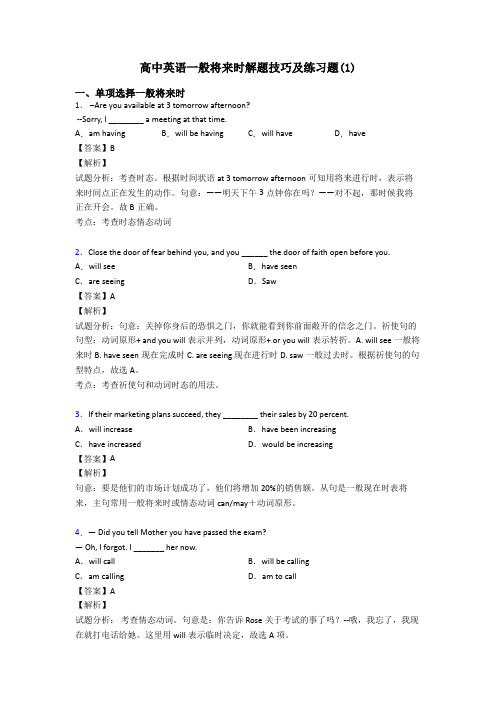
高中英语一般将来时解题技巧及练习题(1)一、单项选择一般将来时1.–Are you available at 3 tomorrow afternoon?--Sorry, I ________ a meeting at that time.A.am having B.will be having C.will have D.have【答案】B【解析】试题分析:考查时态。
根据时间状语at 3 tomorrow afternoon可知用将来进行时,表示将来时间点正在发生的动作。
句意:——明天下午3点钟你在吗?——对不起,那时候我将正在开会。
故B正确。
考点:考查时态情态动词2.Close the door of fear behind you, and you ______ the door of faith open before you. A.will see B.have seenC.are seeing D.Saw【答案】A【解析】试题分析:句意:关掉你身后的恐惧之门,你就能看到你前面敞开的信念之门。
祈使句的句型:动词原形+ and you will表示并列,动词原形+ or you will表示转折。
A. will see 一般将来时 B. have seen现在完成时 C. are seeing 现在进行时D. saw一般过去时。
根据祈使句的句型特点,故选A。
考点:考查祈使句和动词时态的用法。
3.If their marketing plans succeed, they ________ their sales by 20 percent.A.will increase B.have been increasingC.have increased D.would be increasing【答案】A【解析】句意:要是他们的市场计划成功了,他们将增加20%的销售额。
从句是一般现在时表将来,主句常用一般将来时或情态动词can/may+动词原形。
(英语)高中英语一般将来时的基本方法技巧及练习题及练习题(含答案)

(英语)高中英语一般将来时的基本方法技巧及练习题及练习题(含答案)一、单项选择一般将来时1.–Are you available at 3 tomorrow afternoon?--Sorry, I ________ a meeting at that time.A.am having B.will be having C.will have D.have【答案】B【解析】试题分析:考查时态。
根据时间状语at 3 tomorrow afternoon可知用将来进行时,表示将来时间点正在发生的动作。
句意:——明天下午3点钟你在吗?——对不起,那时候我将正在开会。
故B正确。
考点:考查时态情态动词2.---Let’s throw a surprise party for mom’s 50th birthday.---That’s a good idea.We______several of her friends.A.invite B.have invited C.are inviting D.will invite【答案】D【解析】本题考查时态。
根据句意“我们将邀请她的一些朋友”可知用一般将来时。
句意:——让我们在妈妈50岁给她一个惊喜。
——好想法,我们将邀请她的一些朋友。
3.The students have been working hard on their lessons and their efforts _____ with success in the end.A.rewarded B.were rewardedC.will reward D.will be rewarded【答案】D【解析】【分析】【详解】本题考查时态和语态。
解题步骤:1. 确定时态:根据句尾的in the end可知,事情发生在将来,用将来时。
2. 确定语态:efforts和reward是被动关系,应该使用被动语态。
高一英语将来进行时(一)解题方法和技巧及练习题
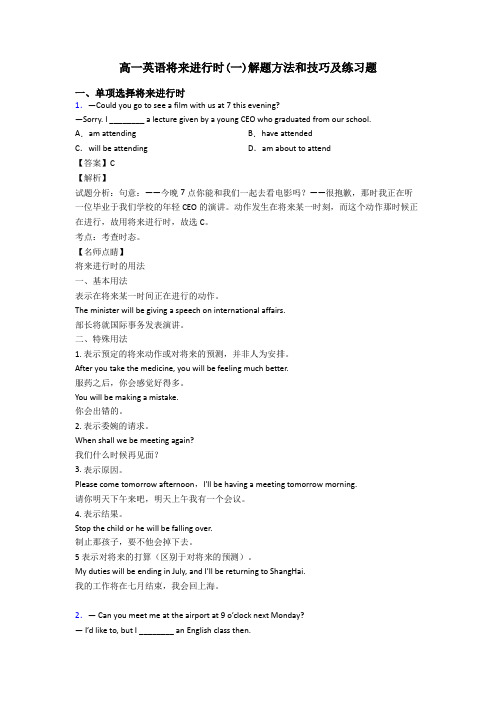
高一英语将来进行时(一)解题方法和技巧及练习题一、单项选择将来进行时1.—Could you go to see a film with us at 7 this evening?—Sorry. I ________ a lecture given by a young CEO who graduated from our school.A.am attending B.have attendedC.will be attending D.am about to attend【答案】C【解析】试题分析:句意:——今晚7点你能和我们一起去看电影吗?——很抱歉,那时我正在听一位毕业于我们学校的年轻CEO的演讲。
动作发生在将来某一时刻,而这个动作那时候正在进行,故用将来进行时,故选C。
考点:考查时态。
【名师点睛】将来进行时的用法一、基本用法表示在将来某一时间正在进行的动作。
The minister will be giving a speech on international affairs.部长将就国际事务发表演讲。
二、特殊用法1. 表示预定的将来动作或对将来的预测,并非人为安排。
After you take the medicine, you will be feeling much better.服药之后,你会感觉好得多。
You will be making a mistake.你会出错的。
2. 表示委婉的请求。
When shall we be meeting again?我们什么时候再见面?3. 表示原因。
Please come tomorrow afternoon,I'll be having a meeting tomorrow morning.请你明天下午来吧,明天上午我有一个会议。
4. 表示结果。
Stop the child or he will be falling over.制止那孩子,要不他会掉下去。
高考英语将来进行时解题技巧和训练方法及练习题(含答案)(1)
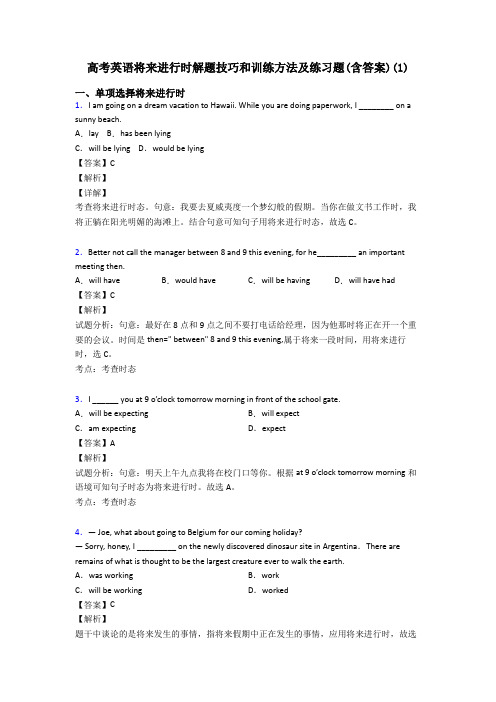
高考英语将来进行时解题技巧和训练方法及练习题(含答案)(1)一、单项选择将来进行时1.I am going on a dream vacation to Hawaii. While you are doing paperwork, I ________ on a sunny beach.A.lay B.has been lyingC.will be lying D.would be lying【答案】C【解析】【详解】考查将来进行时态。
句意:我要去夏威夷度一个梦幻般的假期。
当你在做文书工作时,我将正躺在阳光明媚的海滩上。
结合句意可知句子用将来进行时态,故选C。
2.Better not call the manager between 8 and 9 this evening, for he_________ an important meeting then.A.will have B.would have C.will be having D.will have had【答案】C【解析】试题分析:句意:最好在8点和9点之间不要打电话给经理,因为他那时将正在开一个重要的会议。
时间是then=" between" 8 and 9 this evening,属于将来一段时间,用将来进行时,选C。
考点:考查时态3.I ______ you at 9 o’clock tomorrow morning in front of the school gate.A.will be expecting B.will expectC.am expecting D.expect【答案】A【解析】试题分析:句意:明天上午九点我将在校门口等你。
根据at 9 o’clock to morrow morning和语境可知句子时态为将来进行时。
故选A。
考点:考查时态4.— Joe, what about going to Belgium for our coming holiday?— Sorry, honey, I _________ on the newly discovered dinosaur site in Argentina.There are remains of what is thought to be the largest creature ever to walk the earth.A.was working B.workC.will be working D.worked【答案】C【解析】题干中谈论的是将来发生的事情,指将来假期中正在发生的事情,应用将来进行时,故选C。
高中英语将来进行时的基本方法技巧及练习题及练习题(含答案)
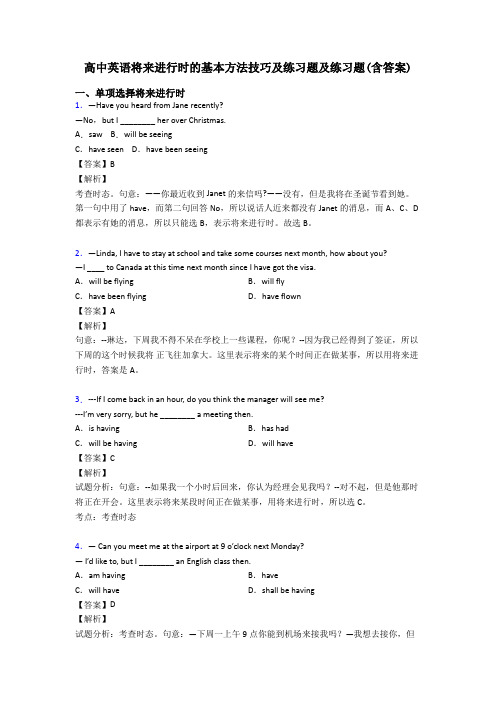
高中英语将来进行时的基本方法技巧及练习题及练习题(含答案)一、单项选择将来进行时1.—Have you heard from Jane recently?—No,but I ________ her over Christmas.A.saw B.will be seeingC.have seen D.have been seeing【答案】B【解析】考查时态。
句意:——你最近收到Janet的来信吗?——没有,但是我将在圣诞节看到她。
第一句中用了have,而第二句回答No,所以说话人近来都没有Janet的消息,而A、C、D 都表示有她的消息,所以只能选B,表示将来进行时。
故选B。
2.—Linda, I have to stay at school and take some courses next month, how about you?—I ____ to Canada at this time next month since I have got the visa.A.will be flying B.will flyC.have been flying D.have flown【答案】A【解析】句意:--琳达,下周我不得不呆在学校上一些课程,你呢?--因为我已经得到了签证,所以下周的这个时候我将正飞往加拿大。
这里表示将来的某个时间正在做某事,所以用将来进行时,答案是A。
3.---If I come back in an hour, do you think the manager will see me?---I’m very sorry, but he ________ a meeting then.A.is having B.has hadC.will be having D.will have【答案】C【解析】试题分析:句意:--如果我一个小时后回来,你认为经理会见我吗?--对不起,但是他那时将正在开会。
高二英语将来进行时的基本方法技巧及练习题及练习题(含答案)
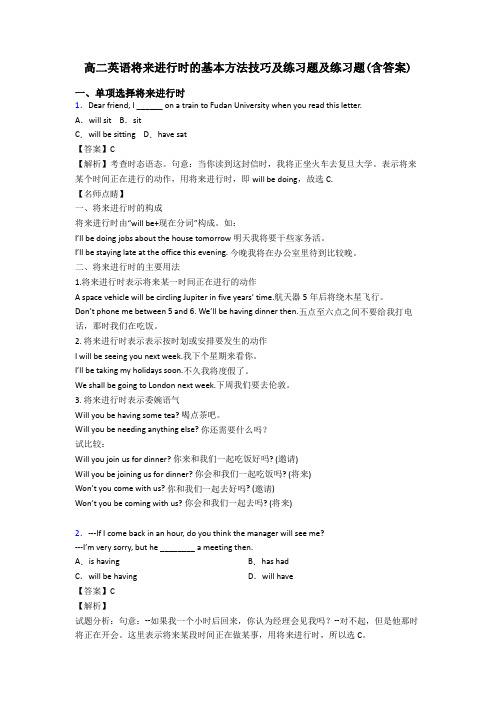
高二英语将来进行时的基本方法技巧及练习题及练习题(含答案)一、单项选择将来进行时1.Dear friend, I ______ on a train to Fudan University when you read this letter.A.will sit B.sitC.will be sitting D.have sat【答案】C【解析】考查时态语态。
句意:当你读到这封信时,我将正坐火车去复旦大学。
表示将来某个时间正在进行的动作,用将来进行时,即will be doing,故选C.【名师点睛】一、将来进行时的构成将来进行时由“will be+现在分词”构成。
如:I’ll be doing jobs about the house tomorrow 明天我将要干些家务活。
I’ll be staying late at the office this evening. 今晚我将在办公室里待到比较晚。
二、将来进行时的主要用法1.将来进行时表示将来某一时间正在进行的动作A space vehicle will be circling Jupiter in five y ears’ time.航天器5年后将绕木星飞行。
Don’t phone me between 5 and 6. We’ll be having dinner then.五点至六点之间不要给我打电话,那时我们在吃饭。
2. 将来进行时表示表示按时划或安排要发生的动作I will be seeing you next week.我下个星期来看你。
I’ll be taking my holidays soon.不久我将度假了。
We shall be going to London next week.下周我们要去伦敦。
3. 将来进行时表示委婉语气Will you be having some tea? 喝点茶吧。
Will you be needing anything else? 你还需要什么吗?试比较:Will you join us for dinner? 你来和我们一起吃饭好吗? (邀请)Will you be joining us for dinner? 你会和我们一起吃饭吗? (将来)Won’t you come with us? 你和我们一起去好吗? (邀请)Won’t you be coming with us? 你会和我们一起去吗? (将来)2.---If I come back in an hour, do you think the manager will see me?---I’m very sorry, but he ________ a meeting then.A.is having B.has hadC.will be having D.will have【答案】C【解析】试题分析:句意:--如果我一个小时后回来,你认为经理会见我吗?--对不起,但是他那时将正在开会。
高考英语将来进行时的基本方法技巧及练习题及练习题(含答案)
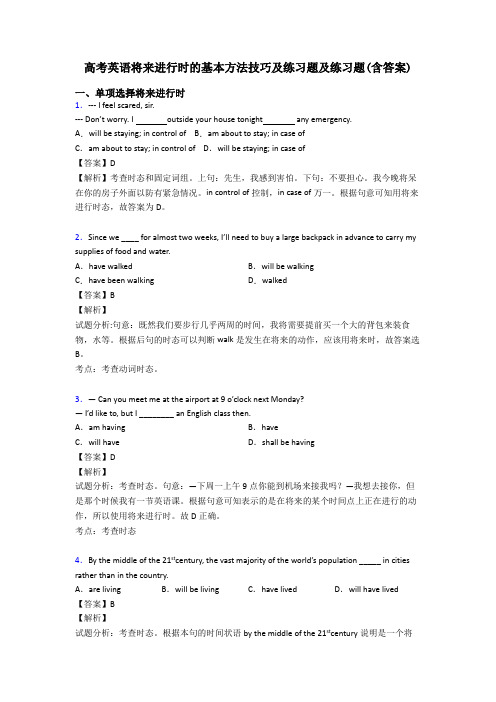
高考英语将来进行时的基本方法技巧及练习题及练习题(含答案)一、单项选择将来进行时1.--- I feel scared, sir.--- Don’t worry. I outside your house tonight any emergency.A.will be staying; in control of B.am about to stay; in case ofC.am about to stay; in control of D.will be staying; in case of【答案】D【解析】考查时态和固定词组。
上句:先生,我感到害怕。
下句:不要担心。
我今晚将呆在你的房子外面以防有紧急情况。
in control of控制,in case of万一。
根据句意可知用将来进行时态,故答案为D。
2.Since we ____ for almost two weeks, I’ll need to buy a large backpack in advance to carry my supplies of food and water.A.have walked B.will be walkingC.have been walking D.walked【答案】B【解析】试题分析:句意:既然我们要步行几乎两周的时间,我将需要提前买一个大的背包来装食物,水等。
根据后句的时态可以判断walk是发生在将来的动作,应该用将来时,故答案选B。
考点:考查动词时态。
3.—Can you meet me at the airport at 9 o’clock next Monday?—I’d like to, but I ________ an English class then.A.am having B.haveC.will have D.shall be having【答案】D【解析】试题分析:考查时态。
- 1、下载文档前请自行甄别文档内容的完整性,平台不提供额外的编辑、内容补充、找答案等附加服务。
- 2、"仅部分预览"的文档,不可在线预览部分如存在完整性等问题,可反馈申请退款(可完整预览的文档不适用该条件!)。
- 3、如文档侵犯您的权益,请联系客服反馈,我们会尽快为您处理(人工客服工作时间:9:00-18:30)。
高中英语将来进行时技巧(很有用)及练习题一、单项选择将来进行时1.—Have you heard from Jane recently?—No,but I ________ her over Christmas.A.saw B.will be seeingC.have seen D.have been seeing【答案】B【解析】考查时态。
句意:——你最近收到Janet的来信吗?——没有,但是我将在圣诞节看到她。
第一句中用了have,而第二句回答No,所以说话人近来都没有Janet的消息,而A、C、D 都表示有她的消息,所以只能选B,表示将来进行时。
故选B。
2.—Hi, Lily. Don’t forget to watch I’m a Singer at 20: 10 this Friday!—What a pity! I_________ in a plane to Hainan for a meeting then.A.will sit B.will be sittingC.am sitting D.sit【答案】B【解析】试题分析:考查时态。
此处表示将来某个时刻正在做某事,应用将来进行时。
句意:——嗨,莉莉,别忘了看本周五晚的节目《我是歌手》。
——真遗憾!那时我将正坐在飞往海南的飞机上。
故B正确。
考点:考查时态3.---If I come back in an hour, do you think the manager will see me?---I’m very sorry, but he ________ a meeting then.A.is having B.has hadC.will be having D.will have【答案】C【解析】试题分析:句意:--如果我一个小时后回来,你认为经理会见我吗?--对不起,但是他那时将正在开会。
这里表示将来某段时间正在做某事,用将来进行时,所以选C。
考点:考查时态4. Ladies and gentlemen, due to an unexpected accident, one of the singers who all of you______ to hear ______ tonight.A.had come; don’t performB.come; won’t performC.have come; won’t be performingD.came; wouldn’t perform【答案】C【解析】试题分析:考查时态。
第一空表示“已经听说”,故用现在完成时;由 tonight 可知,第二空应用将来进行时,表示“因意外事故,一位歌手将不能演出”。
句意:先生们女士们,由于意想不到的事故,你们所有人都听说过的其中一位歌手今晚将不来表演了。
故C正确。
考点:考查时态5.–I’ll come to see your performance at 10:00 tomorrow morning.–I’m sorry, by then my performance_____ and I _____ reporters in the meeting room.A.will end ; will meet B.will have ended ;will be meetingC.will be ended; am going to meet D.is to end ; will meet【答案】B【解析】试题分析:考查时态。
时间状语by then意为“到那时”,故第一空谓语动词应用将来完成时态,根据语境知:到那时我在会议室正在会见记者。
正在进行的动作要用正在进行时,因整个动作是在将来发生的,故第二空谓语动词用将来进行时。
故选B。
考点:考查将来完成时和将来进行时。
6.—I’ll have arrived in Florida together with my family this time tomorrow.—That’s great. You the attractive sunlight then.A.are enjoying B.will be enjoyingC.are about to enjoy D.have been enjoying【答案】B【解析】根据句意:——明天这个时候我和我的家人就已经到达佛罗里达了。
——真棒!那时你们正在欣赏迷人的阳光。
表达将来进行时。
选B。
考点:考查动词时态。
7.You will recognize Jane when you see her at the airport. She _____ a large blue bag. A.carries B.is carryingC.will be carrying D.has carried【答案】C【解析】试题分析:考查动词的时态。
句意:当你到机场时,你就能认出简来,她背着一个蓝色的包。
根据You will recognize Jane可知简还没有到,当时她会背蓝包,发生在将来,故选C 项。
8.—The movie Till Death Do Us Part 《最爱》will be on at 8 pm.What about picking you up at 7pm?—All right.I will have come back from work by then, and I you at home.A.will be waiting for B.will wait for C.have been waiting for D.am waiting for 【答案】A【解析】考查时态,根据上句中在下午七点接你怎么样?答语为好吧,到那个时候我将已经从工作回来了,在家正等着你呢。
等的动作在将来且正在进行,所以使用将来进行时,故选A。
9.What____ you _____this time tomorrow?A.will…do B.will…have done C.will…be done D.will…be doing【答案】D【解析】试题分析:句意:明天这个时候你将会做什么?表示将来某个时刻正在进行的动作,用将来进行时, will be doing,所以选D。
考点:考查时态10.—Could you go to see a film with us at 7 this evening?—Sorry. I ________ a lecture given by a young CEO who graduated from our school.A.am attending B.have attendedC.will be attending D.am about to attend【答案】C【解析】试题分析:句意:——今晚7点你能和我们一起去看电影吗?——很抱歉,那时我正在听一位毕业于我们学校的年轻CEO的演讲。
动作发生在将来某一时刻,而这个动作那时候正在进行,故用将来进行时,故选C。
考点:考查时态。
【名师点睛】将来进行时的用法一、基本用法表示在将来某一时间正在进行的动作。
The minister will be giving a speech on international affairs.部长将就国际事务发表演讲。
二、特殊用法1. 表示预定的将来动作或对将来的预测,并非人为安排。
After you take the medicine, you will be feeling much better.服药之后,你会感觉好得多。
You will be making a mistake.你会出错的。
2. 表示委婉的请求。
When shall we be meeting again?我们什么时候再见面?3. 表示原因。
Please come tomorrow afternoon,I'll be having a meeting tomorrow morning.请你明天下午来吧,明天上午我有一个会议。
4. 表示结果。
Stop the child or he will be falling over.制止那孩子,要不他会掉下去。
5 表示对将来的打算(区别于对将来的预测)。
My duties will be ending in July, and I'll be returning to ShangHai.我的工作将在七月结束,我会回上海。
11.At this time tomorrow over the Atlantic.A.we’re going to flyB.we’ll be flyingC.we’ll flyD.we’re to fly【答案】B【解析】【详解】考查动词时态。
句意:明天这个时候我们将正在飞越大西洋。
根据时间状语At this time tomorrow可知,此处指明天的这个时候正在进行的动作,应使用将来进行时will be doing。
故选B。
12.----Could you meet me at the airport?---I’d like to, but I’m afraid I a very important meeting when you return.A.an attending B.was attendingC.will be attending D.will have attended【答案】C【解析】考查动词的时态。
句意:你能来机场接我吗?我想去,但恐怕当你回来时我正在开会。
根据语境指的是when you return.,正在做某事,故用将来进行时,所以选C项。
13.If you plant watermelon seeds in Spring, you ______ fresh watermelon in the fall. A.would eat B.will have eaten C.will be eating D.ate【答案】C【解析】【分析】考查动词时态。
【详解】句意:如果你在春天种西瓜种子,你将在秋天吃新鲜的西瓜。
根据句意可知主句表示将来的意义,不用将来完成时,可以用将来进行时。
故选C.14.—When shall we have a talk about the design?—Any time except 8 to 9 tomorrow morning, when I_____ in my desired company.A.will be interviewed B.shall be being interviewedC.am going to be interviewed D.am being interviewed【答案】B【解析】【详解】考查时态。
